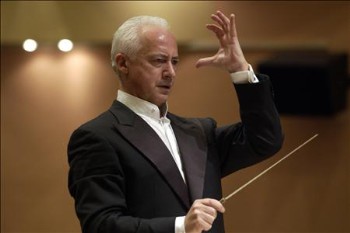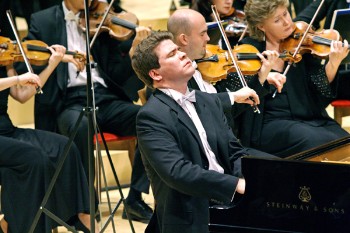Classical Music Review: Russians Do Russians
By Caldwell Titcomb
Back for a return visit to Symphony Hall on April 22 was the National Philharmonic of Russia (NPR), founded in 2003 and not to be confused with the 19-year-old Russian National Orchestra. On the podium for this Celebrity Series event was violin virtuoso Vladimir Spivakov, who will turn 65 in September and is the NPR’s artistic director and principal conductor.

Violin virtuoso Vladimir Spivakov on the podium.
One of the NPR’s prime missions is “to promote and preserve Russia’s cultural heritage,” which was on this occasion reflected in a program devoted entirely to music by four important Russian composers.
Music by Anatol Liadov (1855-1914) opened the concert. He is best known for three tone poems based on Russian fairy tales: “Baba Yaga” (1905), “Kikimora” and “The Enchanted Lake” (both 1909). It was the last offered this time. Not surprisingly, the piece is a pastel, featuring shimmering strings and a prominent harp, with very soft taps on the bass drum. The performance was somewhat lacking in character.
Things picked up with the ensuing Piano Concerto No. 1 by Sergei Rachmaninoff (1873-1943). This is designated Opus 1, and was written in 1891 when the composer was only 18, though the version now universally played benefits from a bit of revision in 1917 (“It is really good now,” said Rachmaninoff). Still, this is a remarkable achievement for a teenager, and a welcome change from the much-played second and third concertos (wonderful as these are).
It is curious that all four of his concertos and the “Paganini Rhapsody” are basically in minor keys: F-sharp minor, C-minor, D-minor, G-minor, and A-minor. He was one of history’s greatest piano virtuosi, and wrote these works for himself to play. In my youth I saw him give a recital and can testify to the enormous size of his hands. So he wrote much that poses inordinate difficulty for pianists with only normal hand spans.
The soloist here was Denis Matsuev, an Irkutsk native who won the Tchaikovsky Competition at 23 and is now at 33 embarked on a major career. He is tall and burly, but with normally sized hands. Although Rachmaninoff reveled in fashioning filigree for the fingers, Matsuev tackled the outer movements’ difficulties admirably and captured the Andante’s poetry nicely. The audience’s enthusiasm for Matsuev elicited a solo encore – “The Hall of the Mountain King” from Edvard Grieg’s music for Ibsen’s “Peer Gynt” – which unfortunately received a slapdash rendition.

Soloist Denis Matsuev, an Irkutsk native who won the Tchaikovsky Competition at 23 and is now at 33 embarked on a major career.
I should add that Rachmaninoff was not only a pianist and composer but also a major conductor, especially within Russia. He did conduct the Boston Symphony in 1909, and was offered its music directorship then and again in 1918 (as well as the leadership of the Cincinnati Symphony), but he turned down the offers.
Shakespeare was the inspiration for the two works that followed intermission: Piotr Tchaikovsky’s “Romeo and Juliet Fantasy-Overture” and four excerpts from the “Romeo and Juliet” ballet by Serge Prokofieff (not Prokofiev – for the reason see my March 27 review of the London Symphony). I have to admit that “Romeo and Juliet” ranks far down my list of the Shakespearean canon. Any work that uses the words “banished” and “banishment” some 26 times in a couple of pages is not an estimable play.
Still, I have to be thankful for the play’s existence, since it spawned so many musical offshoots starting with an opera by Georg Benda (1776). There followed operas by Vincenzo Bellini (1830), Charles Gounod (1867), Frederick Delius (1901), Boris Blacher (1943), and the 2007 Italian musical “Giulietta e Romeo” by Riccardo Cocciante. At the top of the list are Hector Berlioz’s “dramatic symphony” with singers, “Roméo et Juliette” (1839) and the American musical “West Side Story” (1957).
It was composer/conductor Mily Balakirev who suggested that Tchaikovsky (1840-93) undertake a tone poem based on “Romeo and Juliet.” The resulting premiere (1870) led the composer to some minimal tweaking in 1880), and the work proved to be his first mature masterpiece. There are four main themes, all powerfully constructed; and the NPR gave the piece a stunning performance, Spivakov conducting without turning the pages of his score and giving a dramatic sword-stab with his baton at the end.
The British composer Constant Lambert wrote a “Romeo and Juliet” ballet (1925), which Prokofieff (1891-1953) rightly branded as “weak.” As a teenager Prokofieff studied composition with Liadov, but he didn’t get along with his master – or with his other teachers, either, for that matter. By the mid-thirties, however, he produced a huge full-evening “Romeo and Juliet” ballet , containing fifty-odd numbers lasting two and a half hours.
From this masterwork he extracted three orchestral suites while waiting for the staged Leningrad premiere in 1940. The NPR here played four numbers: “Montagues and Capulets,” “Masks,” “Romeo and Juliet Before Parting,” and the “Death of Tybalt.” The orchestra gave these a strong reading, leading to an exciting finish.
The orchestra was coaxed into three encores: Jean Sibelius’ famous “Valse Triste”; a number I could not identify (with a virtuosic trumpet solo); and a movement from a Spanish zarzuela, with prominently shaken maracas.
